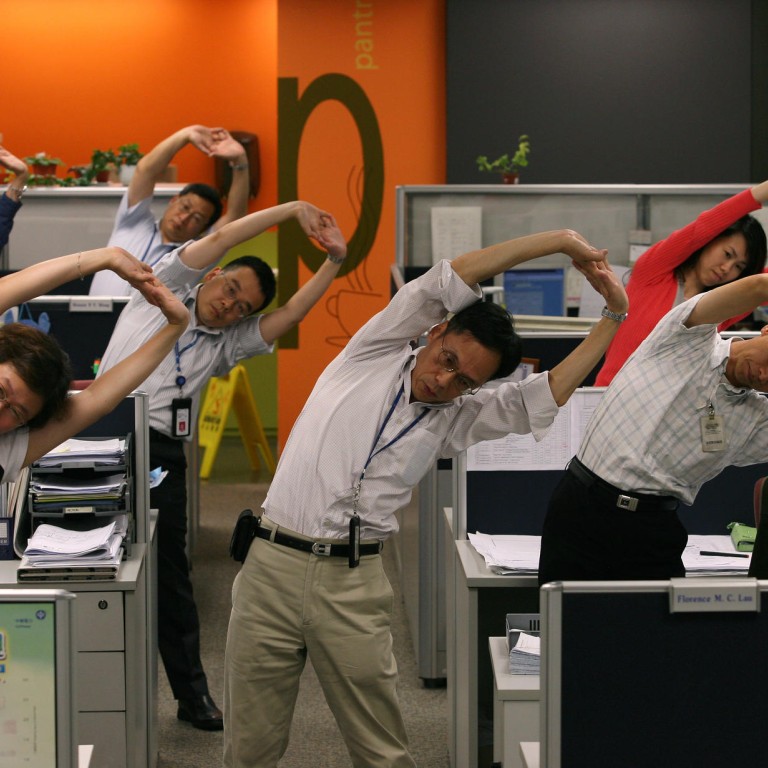
Action stations: office fitness initiatives take root in Hong Kong
The Western trend of encouraging corporate employees take better care of themselves is taking root in Hong Kong
Since last year, staff at Eaton Corporation have been given a choice of two company sponsored health insurance packages: one worth HK$10,000 a year, or another worth HK$5,000 plus HK$5,000 in credits for gym memberships or travel.
For Eaton, an international company that specialises in power management solutions, it's a worthwhile investment to encourage its 100 employees in Hong Kong to lead a healthy lifestyle.
From the health data we found that the staff from the Asia-Pacific region suffer a lot of stress
The initiative goes a step further than ordinary corporate wellness programmes, which usually involve discounted health checks, provision of gym facilities or exercise campaigns. Eaton is among a rising number of companies that are launching such incentive programmes to encourage staff to pursue a healthy lifestyle.
"Staff can choose either the downscale or upscale option for which they have to pay some money out of their own pockets, on top of the HK$10,000 paid by the company, for extra protection," says Agnes Tse Oi-man, vice-president of human resources for Eaton's Asia-Pacific region office.
"For those who are fit and expect to make few doctor visits, they can get the downscale option and enjoy the credits."

"[Companies] would rather make an investment in such incentive programmes instead of having to confront the future costs arising from employees' poor health," he says.
A "know your numbers" campaign is sweeping across the corporate sector, Kung says. Rather than sales figures, however, the numbers refer to the health status of employees. Increasingly, companies are putting their staff through basic health tests to establish a general health profile of their workforce. Blood tests are used to check for, among other things, high levels of cholesterol. "From that information a company can see how many staff are smokers, overweight or prone to diabetes," Kung says. At Eaton, Tse says, a health risk self-assessment was created to gather details about the lifestyles of employees, such as how many cigarettes they smoke a day, their diet and sources of stress.
Tse says such an overall staff health profile can help them identify health risks early, allowing for relevant interventions and solutions. Eaton has 28,000 employees in the Asia-Pacific region, most of whom are assembly line workers, with 20,000 in China and 3,000 in India.
"From the health data we have collected over the past two years, we found that the staff from the Asia-Pacific region suffer a lot of stress," Tse says. "The stress is caused by work, poor diet and lack of exercise, so we have set up a free hotline which staff can call for counselling on stress management."
At CLP Power, incentive programmes take the form of health competitions. Last year, the company launched an inter-department weight-loss competition, where about 180 employees battled to shed the most weight and inches from their waistlines.
"We have also launched a monthly lucky draw to encourage staff to walk up stairs instead of taking the lift," says Albert Lam Fun-sing, CLP Power's deputy director of system operations and chairman of its social recreation club. "The more stairs walked, the higher one's chances of winning the draw."
Disincentives are another approach to encouraging a healthier workforce. In the West, it's not uncommon for companies to fine overweight staff or smokers. In 2010 a new health bill was passed in the US which allowed companies to adopt punitive measures to boost employees' health.
Tyre maker Michelin decreed that male and female staff would have to pay an extra HK$7,800 in insurance fees if their waist was over 101.6cm and 88.9cm respectively. Department store chain Macy's fines employees who smoke US$35 per month if they refuse to join a programme to quit.
A recent survey by human resources firm Aon Hewitt interviewed 800 large- and medium-sized employers in the US. It found that 79 per cent of companies have cash incentives to encourage staff to join health check or fitness programmes, 58 per cent plan to fine staff for leading unhealthy lifestyles and 5 per cent have already implemented punitive programmes.
While Hong Kong companies have yet to adopt the idea of punitive measures, Kung says more bosses have taken to embracing the incentive approach.
"The loss of productivity resulting from absenteeism and poor work performance of staff with poor health is a far greater cost than making an investment in incentive programmes," he says.
Local charity Lok Sin Tong launched an outreach quit-smoking programme at the start of this year with a grant of HK$4.5 million from the Health Department's Tobacco Control Office.
The charity sends counsellors to companies to provide help with creating policies to encourage their employees to stop smoking. So far 65 local companies have joined the programme.
According to a Lok Sin Tong spokeswoman, some companies offer a cash prize or paid leave as rewards for people who give up. Other companies have a buddy programme that pairs a smoker with a non-smoker who tags along to counselling sessions and provides encouragement.
Half the participating companies are in the property management, sales and cleaning sectors, which tend to have many staff who deal with the public, says the spokeswoman.
"We saw that smoking cessation services on the market were already saturated, so in order to have more progress in the drive to snuff out smoking, we approached employers. Companies acknowledge the toll smoking takes on employees' health and hence the companies' operational costs," she says.
"We have found that employers can influence staff more than their families because people care about what their bosses think of them."

